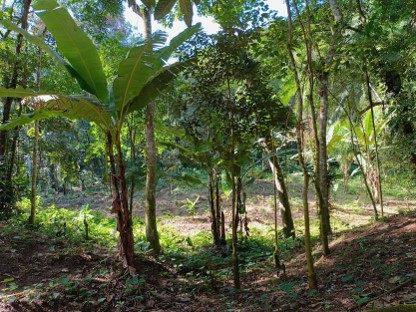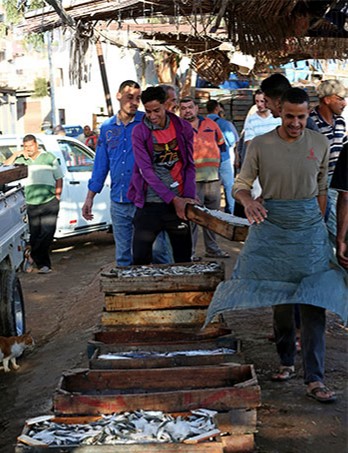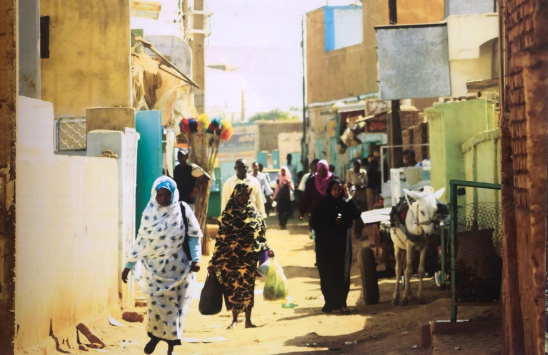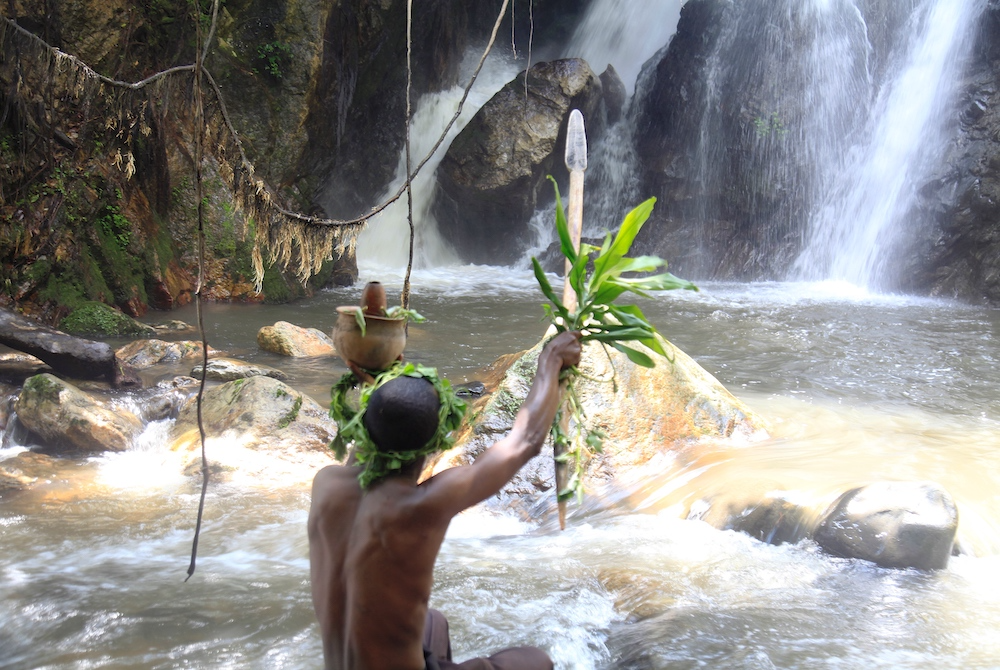"Net Zero: Heritage for Climate Action" is an ongoing initiative conceived within the framework of ICCROM’s First Aid and Resilience for Cultural Heritage in Times of Crisis (FAR) programme, with the generous support of the Swedish Postcode Foundation.
A first-of-its-kind capacity development project, Net Zero is engaging five multidisciplinary teams and communities at five climate hotspots to leverage indigenous knowledge and local practices on climate change mitigation and adaptation.
Through collaborative learning, research and community-led action in the field, the five teams from Brazil, Egypt, India, Sudan and Uganda will develop and field-test viable climate solutions founded on indigenous knowledge and backed by science.
To ensure robust and inclusive research, each team is allocated a seed grant and is assisted by a ‘Sherpa’ who monitors progress, helps summarize data and identify gaps, as well as liaises with the ICCROM-FAR team to promote the work being done at the innovation sites.
In the ongoing first phase, each team will develop a ‘climate story’ for their respective sites, highlighting the root causes of the prevalent climate-related risk, assessing the sustainability of the identified indigenous knowledge to mitigate risk in different climate change scenarios, as well as the potential of these solutions to promote peace, justice and resilience in and around the site.
In sewing together oral histories from source communities and the scientific desk study, the teams are developing the climate stories for their respective sites. These stories will narrate the evolution of the climate and landscape of each site from an era of cottage industries and subsistence living to the current times of large-scale industries and rapid consumption. It will also study the hazard patterns since industrialization and track the urbanization rate and influx of development policies and actions to draw a cause-effect chain.
Finally, teams will be able to identify the root causes of climate-related risks at their sites and tap into appropriate indigenous knowledge to adapt to and mitigate such risks.
Meet the five Net Zero innovation sites
 | 1: Ubatuba, BRAZIL
Ubatuba in Brazil is a natural reserve near São Paulo - one of the most populous cities of the Americas and a bustling business hub. Rich in water resources, Ubatuba is predominantly covered by the Atlantic rain forest and is bordered by 100 km of coast. This project will tap into the knowledge held by the marginalized local Quilombola communities on preserving crop diversity in the Ubatuba. Through verifiable research, the project team will develop inventory systems and seedling banks of native species to mitigate food insecurity. The team leading this project includes representatives of the Quilombola community and the Public Archaeology Laboratory (LAP) at the Centre for Environmental Studies and Research at the University State of Campinas (UNICAMP). They will be supported by local partners including ICOMOS-Brazil Climate Change and Heritage Committee, the Secretariat of Agriculture and Supply of the State of São Paulo (IAC), the Centro Nacional de Monitoramento e Alertas de Desastres Naturais - CEMADEN and the State University of Goiás’ history department. |
 | Site 2: Rosetta, EGYPTRosetta, or Rashid, is a port city on the Nile Delta and a World Heritage Site. Rosetta is known as the place where the Rosetta Stone was found. Today, the city is affected by a rising sea level and increased salinity of the river water. Net Zero will document and analyze the vernacular architectural practices and traditional ways of fishing to reduce the impacts of climate change on the lives and livelihoods of the local community. In close partnership with organizations of fishermen in Egyptian port cities - including Rosetta, Alexandria, Damietta and Port Said - the project will be implemented by the Egyptian Heritage Rescue Foundation (EHRF), together with Cairo University’s Community and Environmental section and the National Authority for Remote Sensing in Egypt. |
Site 3: Jodhpur, INDIAJodhpur is the second-largest city in the Indian state of Rajasthan and is a popular tourist destination featuring magnificent palaces, forts and temples. Set in the stark landscape of the Thar Desert, the city is characterized by a hot, arid climate due to its very high potential for evaporation of water and depletion of groundwater. It faces the compounding climate-related risks of cyclic droughts, extreme heat and building water stress. In partnership with the Risk & Resilience Institute (RRI), a team of emerging professionals from the Confederation of Risk Reduction Professionals (CRRP) in India will study the vernacular architectural practices and traditional water management systems to modify extreme temperatures, protect citizens from solar radiation and cope with water scarcity. Further collaboration with Mahila Housing Trust (MHT) will overcome inequalities and empower women to participate in the design, planning and implementation of climate actions. By joining forces with the Natural Resources Defense Council India (NRDC) and local municipal corporations, the team aims to use this project’s findings to build a culturally-sensitive Heat Action Plan (HAP) for the city of Jodhpur. This will help mitigate heat events in the Jodhpur area that are likely to increase soon. | |
 |
Site 4: Tuti Island, SUDANTuti Island is situated at the confluence of the White and Blue Nile in Sudan and is surrounded by the metropolises - Khartoum, Omdurman and Khartoum North. In recent decades, the island has experienced increased temperatures, prolonged droughts and irregular rainfall patterns, as well as cyclic floods and sea level rise. In partnership with Studio Urban, University of Khartoum, Resurgence and UNDP, Sudan Urban Development Think Tank (SUDTT), the lead of this project, is working to enhance the existing community-led early warning system – Taya – in Tuti Island by cross-linking local knowledge with modern technology. Through the project, the team will create a localized and comprehensive forecasting system in and around the island to mitigate flood impacts. |
 | Site 5: Kasese, UGANDARiver Kabiri flows through Uganda’s Kasese district, between the Ekyisalhalha Kya Kororo sacred cultural site and the boundary of the Rwenzori Mountains National Park, a World Heritage Site. In the last decade, destructive flooding of River Kabiri, induced by irregular rainfall patterns and the rapidly melting glaciers of the Rwenzori Mountains, have disrupted the lives and livelihoods of lowland communities, such as the Bakonzo. The team leading this project comprises community leaders from the Bakonzo community and the Cross-Cultural Foundation of Uganda (CCFU), a local NGO. In close partnership with the Kasese District Local Government Authority, the cultural institution of the Bakonzo, known as Obusinga Bwa Rwenzururu, and the Uganda Wildlife Authority (UWA), the project team will tap into the Bakonzo community’s knowledge and experiences to plant and preserve native plant species to maximize carbon sequestration, control riverbank erosion and improve biodiversity in the region. |
Net Zero: Heritage for Climate Action is comprised of four phases
- Phase 1: Situation analysis and data gathering
- Phase 2: In-person workshop
- Phase 3: Project implementation
- Phase 4: International symposium
What's next?
Upon the successful completion of the field- and desk-based research in Phase 1, the ICCROM-FAR team – together with a team of multidisciplinary area specialists and the Sherpas – will review the climate stories and analyze the findings to develop the curriculum for an in-person workshop (Phase 2). During the workshop, these climate stories will help develop mitigation and adaptation strategies, which will be field-tested in Phase 3. In the final phase, Phase 4, the results of the entire Net Zero project will be disseminated at an online, international symposium that engages ICCROM’s partners from Net Zero and Climate.Culture.Peace to advocate for the inclusion of culture in global climate action.
Stay tuned for further discoveries from the innovation sites.
